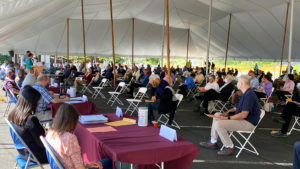
Town moderator Sarah Cannon Holden (left, in teal jacket) addresses the crowd at Lincoln’s Annual Town Meeting on May 15, 2021.
(Editor’s note: the section on the property tax circuit breaker program was updated with corrections on May 19.)
Aside from the accessory apartment issue, the 2021 Annual Town Meeting was largely free of controversy. Here are highlights of some of the measures that were approved:
Town spending
The base budget for fiscal 2022 starting in July is $42.9 million, or $44.4 million when including other articles approved at the May 15 meeting. Of that amount, $23.3 million is for the Lincoln Public Schools and $3.9 million for the town’s share of Lincoln-Sudbury Regional High School expenses.
Voters also approved $1.28 million for capital projects and $937,692 for Community Preservation Act items, as well as $1.82 million for a new public safety radio system. Those lists included two items for the school project ($410,557 for furniture and technology, and $161,200 for playgrounds) that the School Building Committee had been forced to cut from its construction budget earlier.
The Water Department budget also passed unanimously without discussion. Water Commission chair Jim Hutchinson praised new Water Department Superintendent Darin LaFalam’s “easy and calm manner with the staff and his careful and prudent handling of capital projects” and noted that there were no borrowing requests this year. The town has decided against applying to join the MWRA or building a new state-of-the-art water treatment plant, but it will revisit the issue before the next round of major capital requests in a few years, he said.
More information:
Property tax relief
Voters authorized the town to ask the state legislature for permission to allow Lincoln to implement a property tax circuit breaker program. The program would limit the property tax plus water bills to no more than 10% of the income of homeowners over 65 who have lived in town at least five years and who meet certain income and property value limits. It would be paid for by shifting up to 1% of the tax levy onto all the other property owners. Select Board member Jennifer Glass outlined the proposal to the board via Zoom on May 3.
Approximately 250 Lincoln properties could qualify for the program based on assessed value and length of ownership (the town does not have access to incomes). The Board of Assessors estimates that 30-40 households would benefit, and that the additional cost to other taxpayers could be up to about $73 in the first year, and up to about $145 in years two and three. Once approved, the local program must be reauthorized by town-wide vote every three years.
Glass noted on Saturday that a group of donors has contributed about $115,000 to a town property tax relief fund. That fund will likely be used over a five-year period to administer a circuit breaker program for homeowners under 65 who meet the other criteria. A resident asked whether the program being voted on could be funded with private funds. Glass noted the private funding does not replace the proposed circuit-breaker program. “For this to be sustained, it’s difficult to do with private funding,” she said.
Name changes
The Board of Selectmen is now the Select Board and the Council on Aging is now the Council on Aging and Human Services. Ten women have served on the board over the years, and “I’m proud to be the last Selectman elected,” board member Jennifer Glass said before the vote.
Environmental measures
Voters adopted a resolution in support of the country’s continuing participation in the Paris Climate Accord, and action by the state legislature to promote climate justice and expand the use of clean energy. “If you believe we should be bold and move fast on this climate crisis that affects everybody, I urge you to support this motion,” citizen’s petition sponsor Paul Shorb said.
The vote in favor was not unanimous, however. Resident Mike Frankston argued that the Paris Climate Accord disadvantages the United States economically. Increasing the cost of domestic manufacturing and industrial activities will shift those activities to China and other countries that pollute more, thus actually worsening the problem. “There are many unintended consequences,” said Frankston, one of two “nay” votes on the resolution.
Measures that would ban the retail sale and use of polystyrene and some other single-use food-industry plastics also passed. Voters also approved a proposal to seek state permission to require retailers to charge 10 cents for single-use paper and plastic bags (though plastic grocery bags were already banned in 2018). The charge is intended to encourage use of reusable bags and does not impose a tax, since retailers can keep the money.
Bright Light Award
Public health nurse Tricia McGean and Board of Health member Patricia Miller each received a Bright Light award for their “skillful, devoted and compassionate leadership of the town’s pandemic response efforts.”
The two were recognized for their hard work in providing public health information, helping to organize vaccine clinics for seniors, and contact tracing and follow-ups for Lincoln residents who tested positive for Covid-19. They received a standing ovation for their efforts, as did the larger Public Health Team.
Community center
Residents voted to hear a brief report on the status of the proposed community center. Select Board member Jonathan Dwyer said the town has the ability to borrow up to $27 million for capital projects including a community center once the school project is complete in 2023.
Leave a Reply